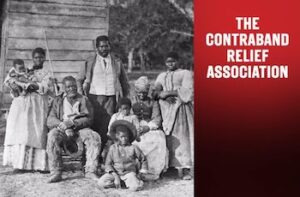
*The Contraband Relief Association was formed on this date in 1862. Washington, D.C., in 1862, became a beacon of liberty for enslaved individuals in bordering slave states like Maryland and Virginia. Many of these individuals ran away and crossed into the District to pursue their liberation.
That year, Congress passed the Compensated Emancipation Act, ending slavery in the District of Columbia and delivering long-awaited freedom to more than 3,000 men, women, and children. While the American Civil War raged, the population of the city transformed into one of soldiers, politicians, and Black freedom seekers. Although Washington, D.C., was a territory without slavery after 1862, these refugees were not completely free. Until 1864, the Fugitive Slave Act of 1850 remained federal law; technically, "fugitives" could be returned to their owners in the South even after reaching Washington, D.C., and other free states in the North.
In March 1862, Congress passed an article forbidding the return of enslaved individuals by military personnel. However, bounty hunters still exploited the chaos and lack of organization in refugee settlements to their advantage, capturing formerly enslaved individuals and returning them for a profit. However, some northerners opposed this controversial law, including Union Major General Benjamin Butler, who coined the term "contrabands of war" when referring to fugitive slaves that crossed into Union-controlled territory.
By calling runaway enslaved men and women "contrabands," they were considered Confederate property confiscated by the Union enemy during wartime, circumventing the Fugitive Slave Act and essentially transferring enslaved individuals from Confederate to Union property. The legacy of the Contraband Relief Association extends beyond its immediate relief efforts during the Civil War.
Its advocacy and humanitarian work laid the groundwork for ongoing efforts to address the legacy of chattel slavery and systemic inequality, contributing to the broader struggle for civil rights and social justice. The Contraband Relief Association was a testament to the power of humanitarian action in times of crisis. Its legacy serves as a reminder of the importance of compassion, solidarity, and resilience in advancing social change and upholding human dignity.